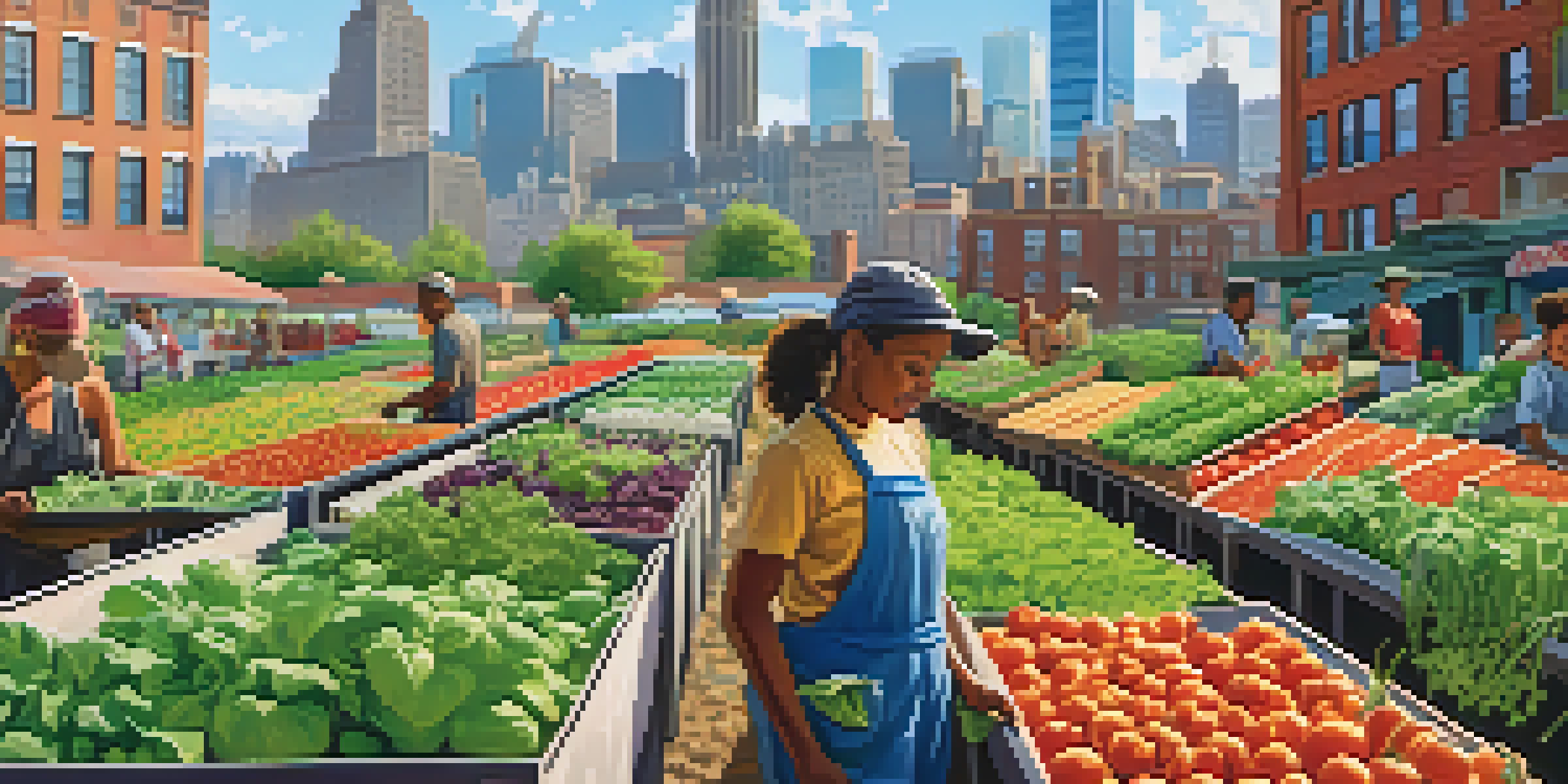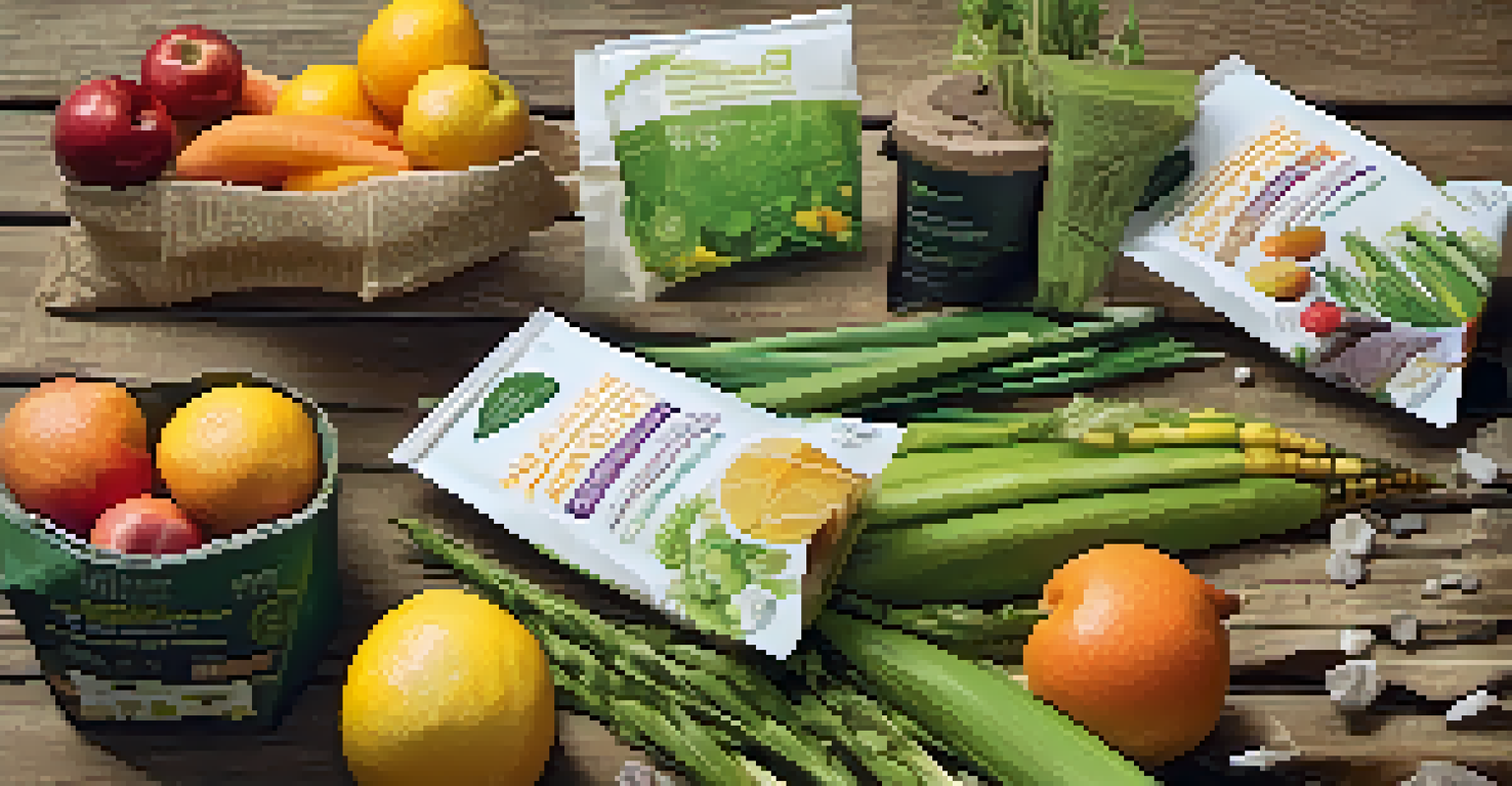Sustainable Vegan Practices to Watch in the Coming Years

Plant-Based Packaging Innovations to Reduce Waste
As the world shifts towards more sustainable practices, plant-based packaging is gaining traction. These eco-friendly alternatives not only reduce plastic waste but also come from renewable sources. For example, companies are now utilizing materials made from mushrooms, seaweed, and even corn starch.
The greatest threat to our planet is the belief that someone else will save it.
This type of packaging can decompose naturally, leaving a minimal environmental footprint. Imagine unwrapping your favorite vegan snack, knowing that the wrapper will break down rather than sit in a landfill for centuries. This is the future of packaging, and it aligns perfectly with vegan principles of reducing harm to the planet.
As consumers become more eco-conscious, the demand for these sustainable options is likely to rise. Keeping an eye on brands that prioritize plant-based packaging will not only support the environment but also push the market toward more responsible practices.
Regenerative Agriculture: A Game-Changer for Veganism
Regenerative agriculture is an approach that goes beyond sustainability by actually improving the health of the soil and ecosystems. This method focuses on practices like crop rotation, cover cropping, and holistic livestock management, which can significantly benefit vegan food systems. By enhancing soil quality, it can lead to more nutritious plants that are better for both people and the planet.

The beauty of regenerative agriculture is that it aims to restore ecosystems while producing food, making it a perfect fit for vegan practices. For instance, farmers who adopt these methods often report improved yields and reduced reliance on chemical fertilizers. This means that the food produced is not only healthier but also more environmentally friendly.
Plant-Based Packaging Reduces Waste
Innovative materials like mushrooms and seaweed provide eco-friendly alternatives to traditional packaging, aligning with vegan principles.
In the coming years, we can expect more vegan brands to partner with regenerative farms, creating a supply chain that emphasizes ecological balance. This shift could redefine how we view food production, making it a collaborative effort between nature and agriculture.
Tech-Driven Veganism: Lab-Grown Meat and Dairy Alternatives
The rise of lab-grown meat and dairy alternatives is revolutionizing the vegan landscape. These products are made from real animal cells but produced in a lab setting, eliminating the need for animal farming. For those hesitant about fully adopting a vegan lifestyle, these alternatives offer a familiar taste experience without the ethical concerns.
The future will be green, or not at all.
As technology advances, lab-grown options are expected to become more affordable and accessible. Imagine being able to enjoy a juicy burger or creamy cheese that was created without harming animals. This innovation could attract a wider audience to veganism, bridging the gap between traditional diets and plant-based choices.
In the next few years, we’ll likely see an increasing number of vegan products hitting the market that utilize these technologies. This could lead to a mainstream acceptance of veganism, making it easier for people to transition to a more compassionate lifestyle.
The Rise of Veganism in Urban Farming Initiatives
Urban farming is blossoming as a sustainable solution to food production in cities. These initiatives often focus on growing plant-based foods, making them a natural ally for the vegan movement. By turning vacant lots or rooftops into green spaces, urban farms not only provide fresh produce but also foster community engagement.
As more people become interested in where their food comes from, urban farming can help demystify the food supply chain. Picture a local neighborhood where residents can pick fresh herbs and vegetables, knowing they were grown just a few blocks away. This direct connection to food sources encourages healthier eating and supports local economies.
Regenerative Agriculture Enhances Veganism
This farming method improves soil health and ecosystem balance, making it a perfect fit for sustainable vegan food systems.
In the coming years, urban farming is likely to expand, with more emphasis on vegan crops and sustainable practices. Communities will benefit from increased food security while promoting a lifestyle that prioritizes plant-based diets.
Innovative Vegan Brands Focusing on Zero-Waste Products
The zero-waste movement is gaining momentum, and vegan brands are stepping up to the challenge. Companies are now creating products that encourage minimal waste, such as bulk packaging options, reusable containers, and compostable materials. This approach aligns perfectly with the values of many vegans who aim to reduce their environmental impact.
Consider a vegan company that offers a subscription service for snacks in reusable containers. Customers can enjoy their favorite treats without the guilt of single-use plastics piling up in landfills. This type of innovation not only meets consumer needs but also promotes a circular economy where products are designed to be reused or recycled.
As more brands adopt zero-waste practices, we can expect a shift in consumer behavior. People will be more inclined to support companies that prioritize sustainability, which will further encourage the growth of eco-friendly vegan options in the market.
The Role of Education in Promoting Sustainable Vegan Practices
Education plays a crucial role in fostering a sustainable vegan lifestyle. Through workshops, online courses, and community events, individuals can learn about the environmental benefits of a plant-based diet. Providing the right information empowers people to make informed choices about their food and lifestyle.
Imagine a local cooking class that not only teaches vegan recipes but also explains the impact of food choices on the planet. This holistic approach can inspire participants to embrace sustainability in their own kitchens. By sharing knowledge, we create a ripple effect that encourages more people to consider the benefits of veganism.
Urban Farming Boosts Local Vegan Food
Urban farming initiatives promote plant-based diets by transforming city spaces into sources of fresh produce and community engagement.
In the coming years, we will likely see an increase in educational initiatives centered around sustainable vegan practices. As awareness grows, we can hope for a generation that prioritizes conscious consumption and environmental stewardship.
Community Support and Networking for Sustainable Veganism
Building a supportive community is vital for anyone looking to adopt sustainable vegan practices. Online platforms and local groups provide a space for individuals to share resources, recipes, and tips on living a vegan lifestyle. This sense of belonging helps to motivate and inspire others on their journey toward sustainability.
Picture a local meetup where people gather to discuss their favorite vegan restaurants, share gardening tips, or even organize plant-based potlucks. These interactions create a vibrant community that encourages ongoing learning and commitment to sustainable practices. The power of community can transform individual efforts into collective action.

As we move forward, fostering these networks will be essential for promoting sustainable veganism. With supportive communities, individuals are more likely to stick to their goals and inspire others to join the movement.